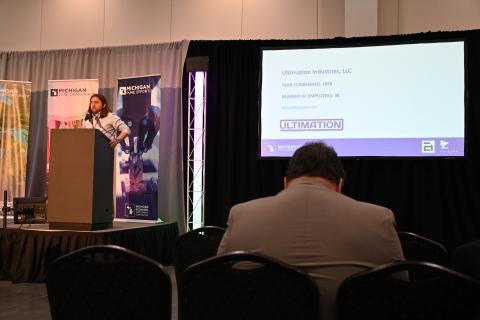When Tommaso Helwig stepped off the stage at the Integr8 conference on May 10 after giving his five-minute speech in a 3D Printer Pitch competition, he felt confident.
Helwig, 28, an engineering manager for Ultimation, a manufacturer of material handling equipment and conveyors based in Roseville, had provided a compelling presentation on why his company should win a Photocentric LC Magna 3D printer. The printer, which included Air Wash L, Cure L2, and a one-year CAD software package, was valued at more than $42,000. He proudly said he was the only pitchman who hadn’t spoken from prepared notes, and that his chances were as good as any. But he also knew his fellow competitors had put forth compelling pitches. Three hours later, Helwig and Ultimation were announced as the winners.
“It was a thrilling moment when they announced the results,” Helwig said. “We are excited to get our hands on the new printer and begin integrating it into our business.”
Helwig and Ultimation were one of five finalists in the pitch competition presented by Automation Alley in partnership with Pure Michigan Business Connect. The other finalists included Marcellus Metalcasters, Pareto Aluminum Systems LLC of Sterling Heights, Brandmotion LLC, and Cargill Salt St. Clair.

Applicants were asked to explain how a 3D industrial printer would solve a labor, capacity or process challenge and support the overall business. Each was scored in five categories: a brief business introduction, a clearly defined problem, a plan for implementation, project impact, and pitchability.
Ultimation centered its pitch around its work with the world’s largest indoor vertical farming company. Due to confidentiality agreements, Helwig couldn’t divulge the name of the company. But he said Ultimation has been working with them for the last couple of years.
Vertical farming is surging in popularity, as there has been a rapid increase in the demand for organic, chemical-free food and leafy vegetables across the globe. Helwig said they are becoming especially popular on the west coast of the United States and in places like the Middle East, where there is a lack of arable land and limited access to water and/or areas in which produce has traditionally been imported.
Ultimation designs and manufactures the automated storage and retrieval systems (AS/RS) and conveyance network that will enable automated farms to function hands-free. The company has experienced a large surge in demand for plastic parts with the emergence of the indoor farming industry over the last five years. They saw the demand as an opportunity to develop and hone its skills in plastic design and manufacturing. It sought the 3D printer with a chance to promote more creative and ambitious plastic designs and give them the tools to print and test new concepts quickly.
“It’s (the Photocentric LC Magna 3D printer) very flexible in terms of functionality,” Helwig said. “It brings plastic manufacturing and production in house as opposed to outsourcing, where we are at the mercy of their costs and turnaround time. All of that will be alleviated or reduced. We will also likely be more aggressive in more plastic-oriented activities. We’ve doubled our ability to make plastic parts.”
Helwig said the new printer will provide better control on heights and bed size of products and allow Ultimation the ability to make larger, more complex parts in areas such as product handling, food contact parts and wear parts.
With greater assurance in their designs, Ultimation would be able to approach new ideas involving plastic that would otherwise have been out of their wheelhouse. Outsource lead times usually quoted in terms of weeks can become days, last-second revisions can be implemented the same day, and no reliance on shipping to deliver parts on time are some of the other benefits Ultimation hopes to see with the new printer. All of that would lead to better turnaround and a better product for their customers. Helwig also hopes Ultimation's efforts in vertical farming will bring the spotlight to other manufacturers in the area that could help specialize in that market and bring the business closer to the Detroit area. He expects the new printer to be delivered in late May and implemented in early June. It will immediately be put to use for products Ultimation has already developed, venture into further development capabilities as new opportunities arise, and test and validate products. Helwig also expects the printer to be used in future Project DIAMOnd initiatives – an Automation Alley 3D printing network Ultimation is part of that has allowed companies to experiment with 3D printing and also produce parts in times of emergency.
Through the Macomb County Department of Planning and Economic Development’s Macomb Next program, businesses across the county are learning more about how Industry 4.0 can help them expand their use of I4.0 technologies now and into the future. To learn more, visit macombnext.com
Don Gardner is a communications specialist for Macomb County Planning and Economic Development.






